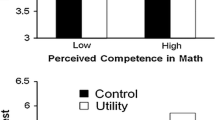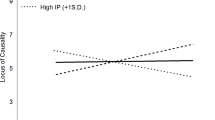Abstract
An experiment is reported that attempted to dissociate the effects of uncontrollability from those of failure in the standard learned helplessness induction procedure involving instrumental tasks. The task was administered to both university and high school students. The primary finding was a grade by controllability interaction, whereby uncontrollability had a larger effect for university students who became much more helpless. Further analysis revealed that while controllability or uncontrollability was the main determinant of university student performance, the performance of the high school students depended primarily upon success or failure. Perhaps we have previously generalized too widely from a restricted subject population.
Similar content being viewed by others
References
Abramson, L. Y., Seligman, M. E. P., & Teasdale, J. D. Learned helplessness in humans: Critique and reformulation.Journal of Abnormal Psychology 1978,87 49–74.
Buys, N. J., & Winefield, A. H. Learned helplessness in high school students following experience of noncontingent rewards.Journal of Research in Personality 1982,16 118–127.
Coyne, J. C., Metalsky, G. T., & Lavelle, T. L. Learned helplessness as experimenter-induced failure and its alleviation with attentional redeployment.Journal of Abnormal Psychology 1980,89 350–357.
Dweck, C. S., & Reppucci, N. D. Learned helplessness and reinforcement responsibility in children.Journal of Personality and Social Psychology 1973,25 109–116.
Hiroto, D. S., & Seligman, M. E. P. Generality of learned helplessness in man.Journal of Personality and Social Psychology 1975,31 311–327.
Jardine, E., & Winefield, A. H. Achievement motivation, psychological reactance, and learned helplessness.Motivation and Emotion 1981,5 99–113.
Seligman, M. E. P.Helplessness. San Francisco: Freeman, 1975.
Tiggemann, M. Noncontingent success versus noncontingent failure and learned helplessness.Journal of Psychology 1981,109 223–228.
Tiggemann, M., & Winefield, A. H. Situation similarity and the generalization of learned helplessness.Quarterly Journal of Experimental Psychology 1978,30 725–735.
Winefield, A. H. Methodological difficulties in demonstrating learned helplessness in humans.Journal of General Psychology 1982,107 255–266.
Winefield, A. H., & Fay, P. M. Effects of an institutional environment on responses to uncontrollable outcomes.Motivation and Emotion 1982,6 103–112.
Winefield, A. H., & Jardine, E. Effects of differences in achievement motivation and amount of exposure on responses to uncontrollable rewards.Motivation and Emotion 1982,6 245–257.
Author information
Authors and Affiliations
Additional information
This work was supported by Research Grant A28015473 from the Australian Research Grants Scheme.
Rights and permissions
About this article
Cite this article
Tiggemann, M., Barnett, A. & Winefield, A.H. Uncontrollability versus perceived failure as determinants of subsequent performance deficits. Motiv Emot 7, 257–268 (1983). https://doi.org/10.1007/BF00991676
Issue Date:
DOI: https://doi.org/10.1007/BF00991676




